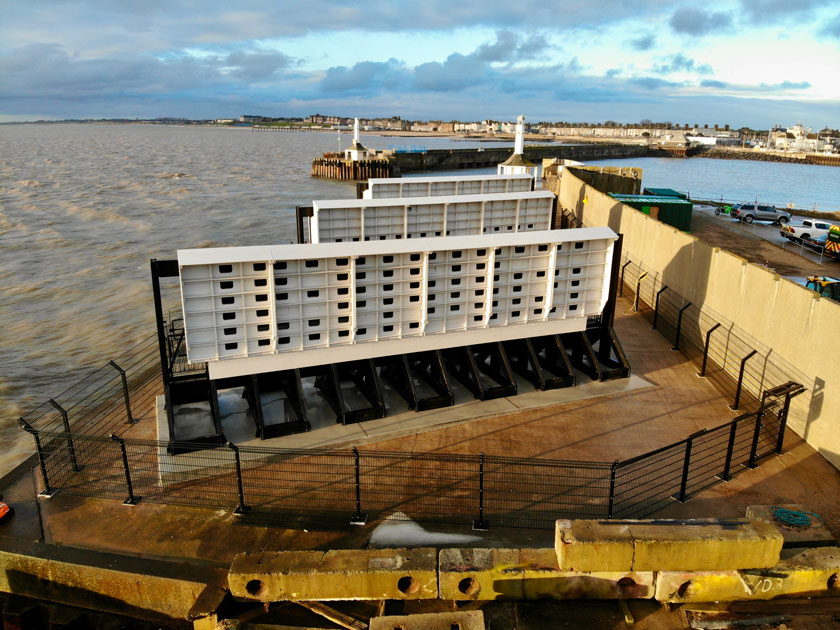
- Renewable developers Vattenfall and ScottishPower Renewables have just completed construction of a kittiwake ‘hotel’ with new nesting structures in the port of Lowestoft, for around 430 pairs of black-legged kittiwakes
- Global kittiwake population has been estimated to have fallen by around 40% since the 1970s, so the kittiwake hotels are vital to protect the species
- The Lowestoft Kittiwake Partnership is also being awarded a £50,000 a year grant to help local businesses and residents by supporting cleaning and other measures to help people and kittiwakes coexist in the town
The first guests will soon be flocking to the region’s newest ‘hotel’ today as renewables developers, Vattenfall and ScottishPower unveil the UK’s first kittiwake nesting structures to support consented offshore wind farms.
The nests will be able to accommodate around 430 pairs of kittiwakes and will help preserve the species for years to come.
A research programme was undertaken and an advisory group – which included representatives from Natural England, RSPB, East Suffolk Council and the Marine Management Organisation – was convened to improve success.
Based on the expert advice, the nesting structure has been designed in a way that replicates the best conditions for nesting and factors in conditions such as aspect, the amount of sunshine and shelter, and the size of the nesting shelves within.
Measures have also been taken to protect the nesting kittiwakes from predators – such as predator-proof fencing at the bottom to protect against mammals like foxes and an overhanging roof to protect against aerial predators.
While kittiwakes are known to be tolerant of human activity, the artificial nests are sited well away from the town and active port at the outer harbour to minimise interaction with human activity and property.
The construction of the nesting structure would not have been possible without invaluable support from Associated British Ports, Port of Lowestoft, on whose land the ‘hotel’ is built and J.Murphy & Sons who carried out the construction.
The environment is important to both Vattenfall and ScottishPower Renewables and this development will help to compensate for the potential impacts on breeding black-legged kittiwakes in North Yorkshire by ensuring they have a safe nesting area.
Separate to the nesting requirement, Vattenfall is also looking to support and work closely with the Lowestoft Kittiwake Partnership and has made a £50,000 a year funding commitment for five years.
This will help the Partnership to engage with and provide advice and support for local business and residents living alongside nesting kittiwakes, as well as money for cleaning up after kittiwakes, installing safe preventative measures to protect buildings, and creating alternative nesting sites where kittiwakes won’t come into conflict with people in Lowestoft.

Rob Anderson, Project Director of Vattenfall’s Norfolk Offshore Wind Zone, said:
“We’re really pleased that we’ve been able to play our part in protecting seabirds and making sure that Vattenfall’s Norfolk Offshore Wind Zone supports local wildlife. The east of England is famous for its seabirds so it’s great we’ve been able to look after them for generations to come.
“The funding for the Kittiwake Partnership will really help Lowestoft residents and businesses, who will be able to access support and advice on how to safely manage the impact of kittiwakes in the town. This is all part of our long-term commitment to the area as we build one of the world’s largest wind farms.”
Ross Ovens, ScottishPower Renewables’ Managing Director for the East Anglia Hub, added:
“This project is a great example of how responsible renewables development can ensure that windfarms and wildlife can happily co-exist so we can all benefit from a cleaner and greener future.
“Ecology and conservation are key issues for us and we always focus on how we can enhance the environment as well as mitigate the impact of any planned developments, and that’s exactly what we have done here. I look forward to seeing the first guests coming to this unique ‘hotel’ and enjoying the great warm welcome this region is famous for.”
A spokesperson from the Lowestoft Kittiwake Partnership said:
“We’re delighted Vattenfall will be supporting the Lowestoft Kittiwake Partnership. As a globally threatened seabird, kittiwakes need our help to prevent them slipping further towards extinction, but in towns like Lowestoft which are home to urban nesting colonies in the summer we also need to think about how we manage the mess they make around their nesting sites and the impact this has on people and businesses.
“Vattenfall’s funding commitment will mean that we can pay for cleaning and other interventions to help people and businesses and enable kittiwakes to nest in more suitable locations, making life in Lowestoft better for the people who live there.”
Andrew Harston, Director, Wales & Short Sea Ports, Associated British Ports said:
"ABP is investing significantly in the Port of Lowestoft over the coming years to meet the offshore energy industry’s current and future needs and serving customers in the growing Southern North Sea energy sector. As we develop the port for our customers it’s equally important that we do so in a truly sustainable way. Providing a safe breeding ground for kittiwakes is one example of how our teams across ABP continuously strive to protect and promote biodiversity.
“ABP’s recently published sustainability strategy – Ready for Tomorrow – highlights that while most of our land is used for commercial purposes, we want to prioritise and develop nature-enhancement projects. We are proud to be part of the Lowestoft Kittiwake Partnership to help promote the protection of an important endangered species."